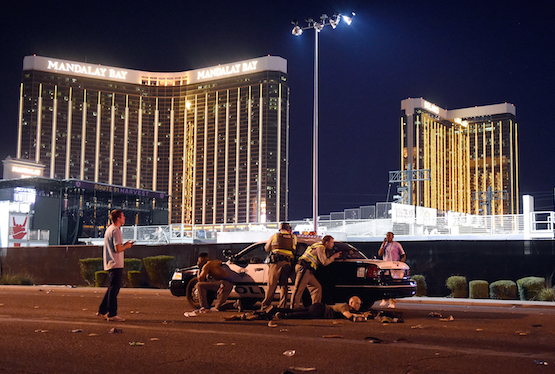
MGM Resorts’ recent legal maneuver to protect itself against multiple lawsuits stemming from the mass shooting last October at the Mandalay Bay hotel in Las Vegas has raised many eyebrows—as well as a quick #BoycottMGM backlash on social media. The victims and their attorneys have expressed outrage, but in other corners the jury’s still out on whether MGM Resorts’ manuever will ultimately pay off.
On July 13, MGM Resorts filed multiple lawsuits naming more than 1,000 of the shooting victims—individuals who have either sued or threatened to sue the company—as defendants. The suits are an action for declaratory relief, requesting a change in venue from state to federal court. They do not request money or attorney’s fees from the defendants. They do, however, ask for protection from legal actions by the victims under the SAFETY (Support Antiterrorism by Fostering Effective Technologies) Act.
Under the act, federally certified security equipment makers and security service providers are not held liable if they fail to prevent a terrorist attack. MGM is arguing that the law renders it immune from liability for the shooting because the event meets two qualifications: the company has deemed it an act of terrorism, and MGM hired a Department of Homeland–certified security company, CSC, for the concert.
Attorneys are curious to see how the case unfolds. “It’s the first time the SAFETY Act has been tested in any way,” says Dismas Locaria, a partner with Washington, D.C. law firm Venerable LLP, whose practice focuses on government contracts and Homeland Security Act provisions. He says whether the court accepts MGM’s contention that the shooting represented an act of terrorism turns on three components: the act must be (1) unlawful, (2) cause harm and (3) use instruments, weapons or other methods “designed to cause mass destruction, injury or other loss to citizens of institutions of the United States.” While the first two elements are not in dispute, Locaria says the third qualification might not be as clear-cut as MGM would contend.
The SAFETY Act, as Locaria understands it, “is meant for significant events—obviously 9/11, things along those lines. Whether an active shooter falls into that . . . we’ll have to wait and see.”
Locaria says the SAFETY Act is potentially a useful tool for hospitality companies to shield themselves from liability. “If this decision comes out negative, I worry about how that might impact the security industry and the hospitality industry,” he says.
If the court agrees with MGM’s arguments, that does not shut the hundreds of plaintiffs out of collecting damages. They would likely be eligible for federal funding designated to assist victims of mass violence and terrorism. The U.S. Department of Justice Crime Victims’ Fund has distributed tens of millions of dollars in response to incidents such as the Boston Marathon bombing.
Dealing with public backlash
MGM clearly is looking out for the company’s and shareholders’ interests in filing these suits. But public reaction has been harsh. Many have expressed outrage, and headlines have underscored MGM’s attempt to dodge liability.
MGM tried to soften the impact of the lawsuit by presenting it as a way to streamline litigation.
“From the day of this tragedy, we have focused on the recovery of those impacted by the despicable act of one evil individual,” MGM Resorts spokeswoman Debra DeShong explained in a statement. She added that federal court was the appropriate place for litigation “relating to incidents of mass violence like this one where security services approved by the Department of Homeland Security were provided.”
Federal court, the statement continued, “is an appropriate venue for these cases and provides those affected with the opportunity for a timely resolution. Years of drawn-out litigation and hearings are not in the best interest of victims, the community and those still healing.”
In its defense, MGM also noted that the courts have a history of rejecting claims of negligence following mass shootings in which someone “carried out a cold, calculated plan of extreme lethal violence.” Pointing the finger at companies like MGM, the filing argued, would “saddle businesses across the country with crippling liability for the evil acts of madmen.”
Raya Casas, who advises clients on crisis management as president of Wragg & Casas in Miami, says the way MGM handled the filing might ultimately hurt the company’s reputation more than the mass shooting did.
“Faced with the conflicting interests of limiting liability and safeguarding its reputation, MGM chose a legal strategy that may be valid but is perceived as beyond insensitive,” he observes. “MGM compounded the damage with its media statement that the lawsuit provides an avenue for a timely resolution ‘in the best interest of the victims.’ Protect the company? Yes. Pretend it helps the victims? Absolutely no.”
Instead, Casas suggests, the legal strategy should have been communicated without any sugar-coating, clearly explaining the obligation to protect the company and why the action was necessary.
Eric Kalis, an account director with BoardroomPR in Fort Lauderdale, Florida, sees MGM’s messaging—positioning the move as a way to expedite litigation for the victims—as the right call. “The question going forward: does the court of public opinion hold MGM responsible for this heinous incident or not? We believe they don’t,” he adds. “The public most likely sees this as an extreme tragic incident that could not have been prevented by MGM.”
Going forward, Kalis says, “public blowback is a short-term phenomenon that can be overcome with time. The company is doing what it has to do to defend itself and protect its investments and employees. Right now they see that as the big-picture priority as a tradeoff for any short-term hit to their reputation.”
